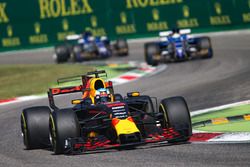Monza showed F1 must scrap three-engine limit plan - Horner
Red Bull boss Christian Horner plans a fresh push to scrap rules limiting drivers to three engines per year from 2018, in the wake of the Italian Grand Prix grid penalty farce.

Photo by: Sam Bloxham / Motorsport Images









Formula 1 found itself being criticised by fans ahead of the Monza race when nine drivers were handed grid penalties for either engine or gearbox changes.
That situation has prompted fears that things could get even worse in the future as F1's rules get tougher, with each driver restricted to just three engines per campaign from the start of next year.
Earlier this year, Horner tried to get F1's Strategy Group to abandon that plan and keep the current four-engine limit in place – but his efforts did not get enough support.
However, in the wake of the Monza situation, Horner says he will raise the matter again when F1's Strategy Group meets in the next few weeks.
He thinks it should be a priority for F1 chiefs to change things to better cope with the ever complicated V6 turbo hybrids.
"I think this engine has done nothing positive for Formula 1 since it was introduced," said Horner, who has long been critical of the turbo engine rules that came in for 2014.
"What concerns me is that we are now going to three engines for next year with more races. And to me, that should be number one of the agenda at the next Strategy Group meeting.
"I tried to get it changed at an earlier meeting in the year, but there was no support for it. I would hope that there would now be a different outcome, with teams staring down the barrel of further penalties between now and the end of the year."
New penalties
As well as scrapping the move to go down to three engines, Horner believes that serious thought needs to be given to a new system for grid penalties, with the current structure unpopular with those in the sport as well as fans.
"It is hard enough for us to understand," he said. "Even going to the grid, we were trying to work out if we were going to be 12th or 13th, because [Sergio] Perez had picked up a penalty but we didn't know if he had picked it up before or after somebody. So it is too confusing.
"I think there needs to be a serious look at to see whether there is a better way of penalising a manufacturer or an entrant, constructor, as opposed to messing around with the grid, because I think it will only get worse. It will be a shame to see this championship decided on grid penalties."
False economy
The idea to reduce the number of engines used per season was originally intended as a way to help reduce costs.
However, manufacturers are now finding that delivering long-life components – and proofing them on dynos – is actually not turning out to be any cheaper.
Horner has gone as far as suggesting that F1 may be better off actually allowing more engines to be used.
"The whole purpose of this limitation in engines was also cost saving, but of course it is not saving the costs," he said. "The engines are going on a world tour anyway, they are being used and you are just incurring penalties as a result.
"Perhaps we need to get back to an equitable balance – perhaps five engines is the right number rather than four going to three."
Be part of Motorsport community
Join the conversationShare Or Save This Story
Subscribe and access Motorsport.com with your ad-blocker.
From Formula 1 to MotoGP we report straight from the paddock because we love our sport, just like you. In order to keep delivering our expert journalism, our website uses advertising. Still, we want to give you the opportunity to enjoy an ad-free and tracker-free website and to continue using your adblocker.















Top Comments